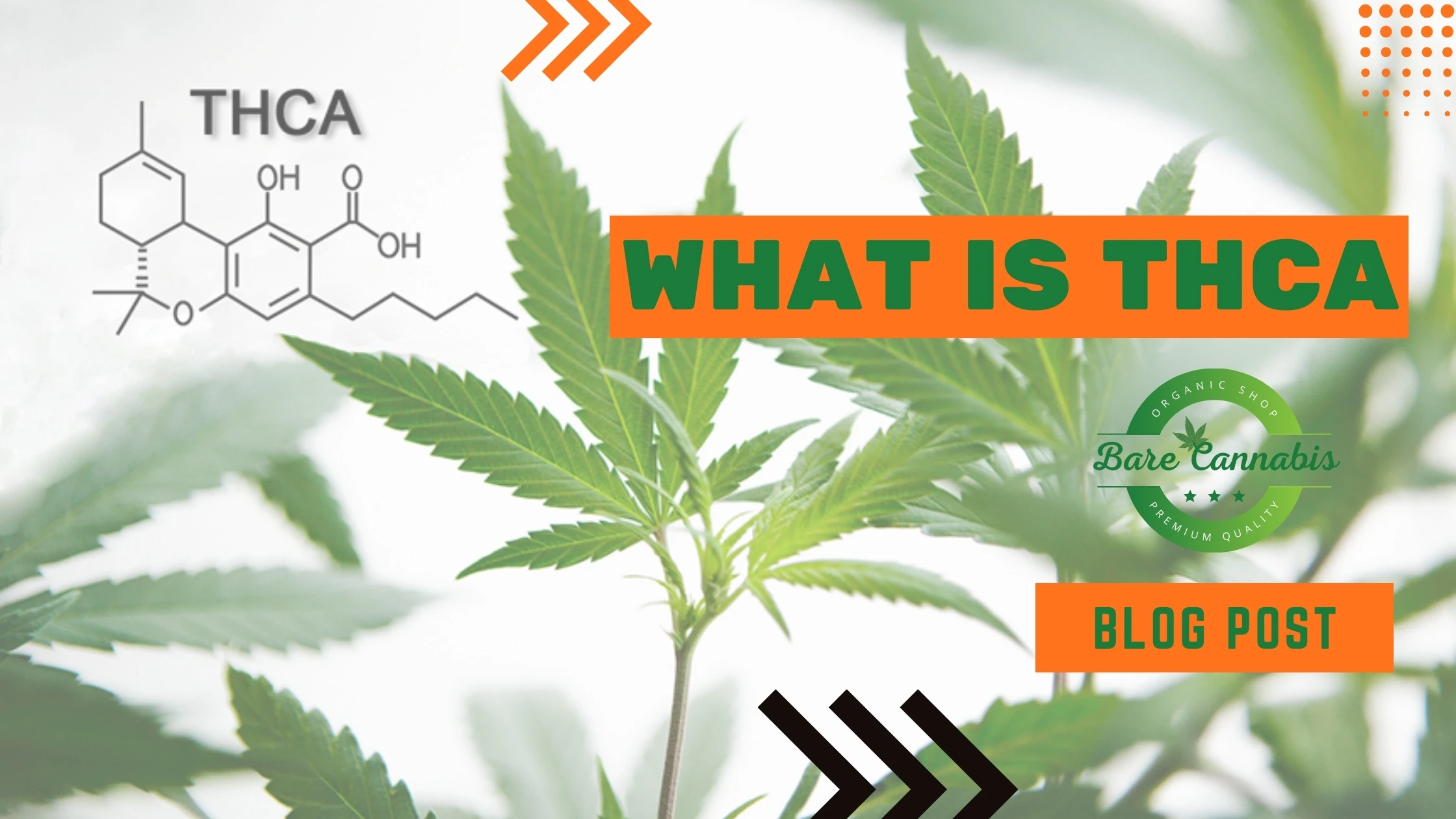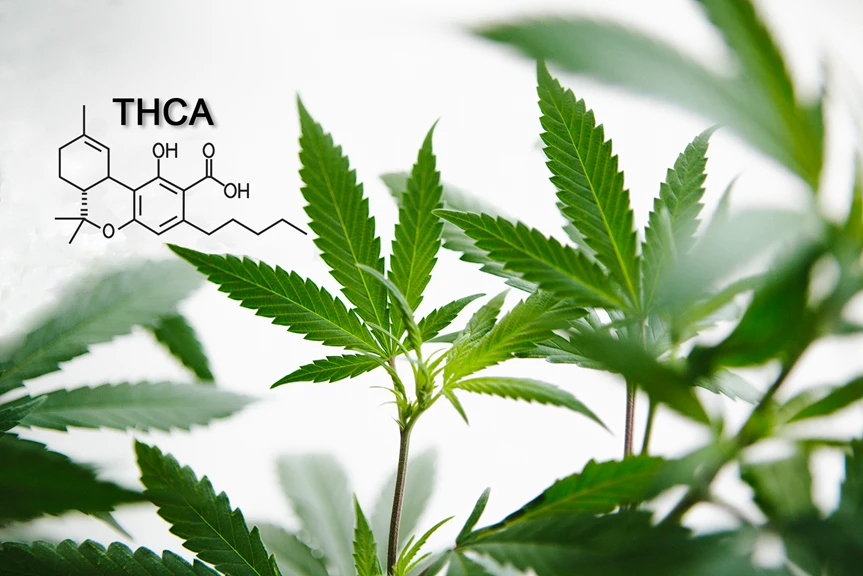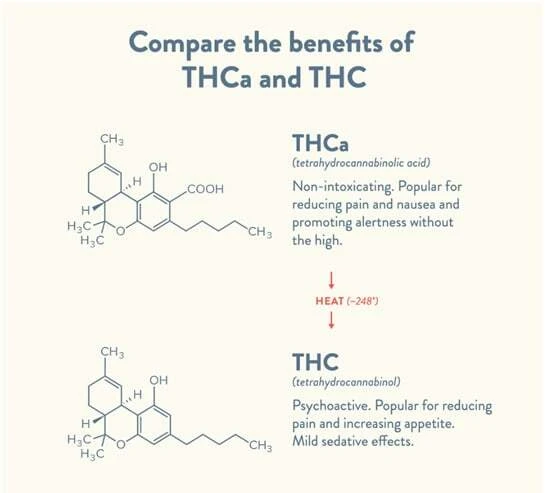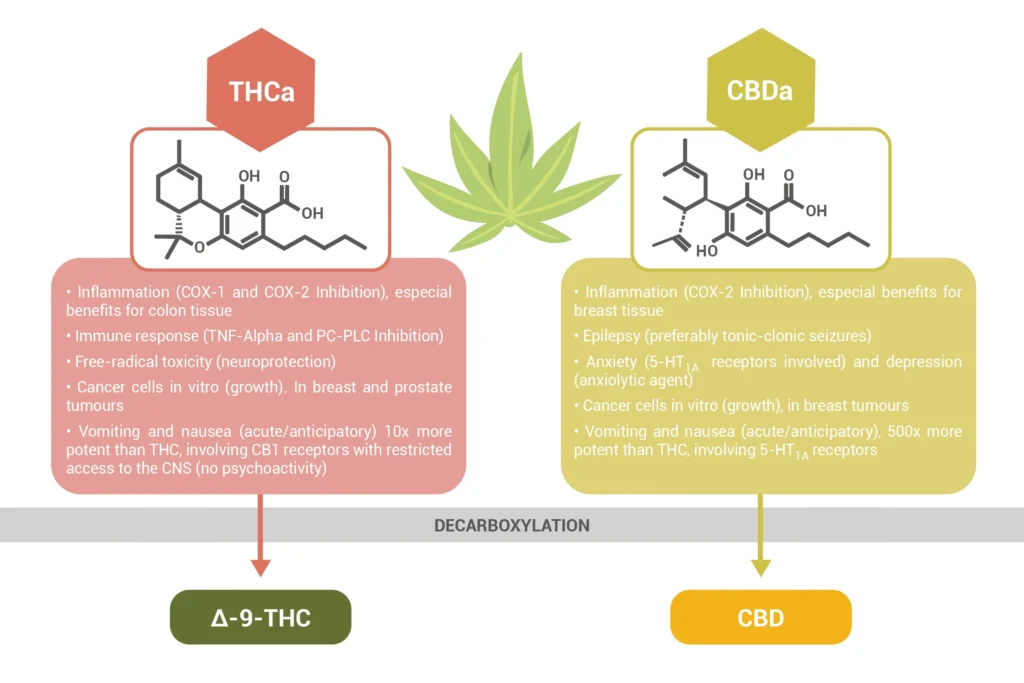
What is THCA
Introduction to THCA
As a cannabis enthusiast, I have always been intrigued by the different compounds found in the plant and how they interact with our bodies. One particular compound that has gained attention in recent years is THCA. So, what is THCA and how is it different from THC?
What is THCA and how is it different from THC?
THCA, or tetrahydrocannabinolic acid, is a non-psychoactive compound found in raw cannabis plants. It is the precursor to THC, the well-known psychoactive compound that gives marijuana its intoxicating effects. While THCA itself does not produce a “high,” it does offer a range of potential therapeutic benefits.
The main difference between THCA and THC lies in their chemical structures. THC is formed when THCA is exposed to heat or light, a process known as decarboxylation. This transformation occurs when cannabis is smoked, vaporized, or cooked, activating the psychoactive properties of THC.

The effects of THCA on the body
While THCA does not have the same psychoactive effects as THC, it still interacts with our bodies in interesting ways. Research suggests that it may have anti-inflammatory, neuroprotective, and antiemetic properties, making it a potential tool for managing various health conditions.
One of the most notable effects of THCA is its potential to reduce inflammation. Inflammation is a common factor in many chronic conditions, such as arthritis, Crohn’s disease, and multiple sclerosis. Studies have shown that THCA may help reduce inflammation by inhibiting the production of pro-inflammatory molecules in the body.
Additionally, THCA has shown promise as a neuroprotective agent. Research conducted on animal models suggests that it may help protect brain cells from damage caused by oxidative stress and inflammation. This could have implications for the treatment of neurodegenerative diseases like Alzheimer’s and Parkinson’s.
Benefits of THCA for various health conditions
THCA has shown potential in managing a range of health conditions, thanks to its unique properties. Let’s explore some of the potential benefits of THCA for specific ailments:
- Pain management: THCA may help alleviate chronic pain by reducing inflammation and modulating pain receptors in the body.
- Nausea and vomiting: THCA’s antiemetic properties make it a potential treatment for chemotherapy-induced nausea and vomiting.
- Muscle spasms: THCA’s muscle relaxant properties may provide relief for conditions such as multiple sclerosis and spinal cord injuries.
- Cancer: While more research is needed, preliminary studies suggest that THCA may have anti-cancer properties, potentially inhibiting the growth of tumour cells.
THCA vs THC: Understanding the difference
THCA and THC may sound similar, but they have distinct properties and effects. THC is the compound responsible for the psychoactive effects of cannabis, while THCA is the non-psychoactive precursor. When cannabis is heated or exposed to light, THCA is converted into THC, resulting in the characteristic “high” associated with marijuana use.

It’s important to note that THCA is not converted into THC when consumed raw or in the form of non-psychoactive products. This means that consuming raw cannabis or THCA-infused products will not produce a psychoactive effect, making it a suitable option for those who want to experience the potential therapeutic benefits without the intoxicating effects.
How does THCA interact with the endocannabinoid system?
To understand how THCA interacts with our bodies, we need to delve into the endocannabinoid system (ECS). The ECS is a complex network of receptors, enzymes, and endocannabinoids that helps regulate various physiological processes, including mood, pain, appetite, and inflammation.
thca bud interacts with the ECS by indirectly influencing the activity of cannabinoid receptors. It is believed to inhibit the enzyme FAAH (fatty acid amide hydrolase), which is responsible for breaking down anandamide, a naturally occurring endocannabinoid that binds to cannabinoid receptors.
By inhibiting FAAH, thca bud may increase the levels of anandamide in the body, leading to potential therapeutic effects. Anandamide is often referred to as the “bliss molecule” due to its role in regulating mood and promoting feelings of well-being.
THCA products and consumption methods
Now that we have a better understanding of THCA and its potential benefits, let’s explore the different thca bud products and consumption methods available.
What is THCA Flower?
THCA flower refers to cannabis buds that have not undergone decarboxylation, meaning the thca bud remains in its raw form. It is often sought after by those looking to harness the potential therapeutic benefits of cannabinoids without experiencing the psychoactive effects of THC.

Exploring THCA flower pounds, weed, gummies, hemp, and bud
THCA-rich flower pounds, weed, thca gummies, thca hemp, and bud are some of the popular options for those seeking the potential benefits of THCA. These products come in various strains and potencies, allowing users to choose the one that best suits their needs.
THCA flower pounds and weed can be smoked or vaporized, providing a quick and efficient way to experience the potential therapeutic effects. Gummies infused with THCA offer a tasty and discreet option, perfect for those who prefer not to smoke.
Hemp-derived THCA products are also gaining popularity. Hemp contains low levels of THC, making it legal in many places. These products provide a convenient and legal way to access the potential benefits of THCA without the psychoactive effects of THC.
THCA edibles: A delicious and discreet option
THCA-infused edibles are another popular choice for those looking to incorporate THCA into their wellness routine. From chocolates to baked goods, there is a wide range of delicious options available.
THCA edibles offer a discreet and convenient way to consume THCA, making them suitable for those who want to enjoy the potential benefits without drawing attention. However, it’s important to note that the effects of edibles may take longer to kick in compared to other consumption methods, so patience is key.
Is THCA psychoactive? Understanding the “high” factor
One of the most common questions surrounding THCA is whether it produces a psychoactive effect. The answer is no – THCA itself is not psychoactive. The “high” associated with cannabis comes from the conversion of THCA to THC when exposed to heat or light.
Consuming raw THCA or THCA-infused products will not produce a psychoactive effect. This makes THCA an appealing option for those who want to experience the potential therapeutic benefits without feeling intoxicated.
The legal status of THCA and its implications
The legal status of THCA varies depending on where you live. In some jurisdictions, thca weed may be considered a controlled substance, while in others, it may be legal to possess and use. It’s crucial to familiarize yourself with the laws and regulations of your area before purchasing or using thca weed products.
Understanding the legal implications of thca weed is essential to ensure you stay within the boundaries of the law. Always purchase thca weed products from reputable sources and follow local regulations to avoid any legal complications.
Conclusion: Harnessing the power of THCA for wellness
THCA is a fascinating compound with a range of potential therapeutic benefits. While more research is needed to fully understand its effects and mechanisms of action, early studies suggest that thca weed may offer relief for various health conditions, including inflammation, pain, nausea, and muscle spasms.
Whether you choose to consume thca weed through flower pounds, gummies, edibles, or other products, it’s important to prioritize quality and transparency. Look for reputable sources and consult with a healthcare professional to determine the best approach for your individual needs.
As we continue to explore the potential of cannabis and its compounds, thca weed stands out as a promising option for those seeking natural alternatives for their well-being. With careful consideration and responsible use, we can harness the power of thca weed to enhance our wellness journey. Follow our Instagram Page For more offers and deals.
FAQs
Q1: What is the difference between THCA and THC?
THCA is a non-intoxicating compound found in raw cannabis plants, while THC is the psychoactive compound responsible for the “high” associated with marijuana. THCA converts to THC through decarboxylation, which typically occurs when heat is applied.
Q2: Does THCA get you high?
No, THCA itself does not produce psychoactive effects. However, when heated or decarboxylated, thca weed converts to THC, which can produce a “high.”
Q3: What are the potential benefits of THCA?
THCA has shown potential benefits for various health conditions, including anti-inflammatory properties and relief from nausea and vomiting in chemotherapy patients. However, more research is needed to fully understand its therapeutic potential.
Q5: Is THCA legal?
The legal status of THCA varies depending on the jurisdiction and the form in which it is sold. It’s essential to research and understand the laws and regulations in your area before purchasing or using thca weed products.
Leave a Reply Cancel reply
Tags
Recent Posts
Wild Hemp Cigarettes | Everything You Need To Know 2024 | Bare Cannabis
Peanut Butter Breath Strain
GMO Cookies Strain
Pink Death Strain: A Comprehensive Guide 2024 | Bare Cannabis

What is THCA
Introduction to THCA
As a cannabis enthusiast, I have always been intrigued by the different compounds found in the plant and how they interact with our bodies. One particular compound that has gained attention in recent years is THCA. So, what is THCA and how is it different from THC?
What is THCA and how is it different from THC?
THCA, or tetrahydrocannabinolic acid, is a non-psychoactive compound found in raw cannabis plants. It is the precursor to THC, the well-known psychoactive compound that gives marijuana its intoxicating effects. While THCA itself does not produce a “high,” it does offer a range of potential therapeutic benefits.
The main difference between THCA and THC lies in their chemical structures. THC is formed when THCA is exposed to heat or light, a process known as decarboxylation. This transformation occurs when cannabis is smoked, vaporized, or cooked, activating the psychoactive properties of THC.

The effects of THCA on the body
While THCA does not have the same psychoactive effects as THC, it still interacts with our bodies in interesting ways. Research suggests that it may have anti-inflammatory, neuroprotective, and antiemetic properties, making it a potential tool for managing various health conditions.
One of the most notable effects of THCA is its potential to reduce inflammation. Inflammation is a common factor in many chronic conditions, such as arthritis, Crohn’s disease, and multiple sclerosis. Studies have shown that THCA may help reduce inflammation by inhibiting the production of pro-inflammatory molecules in the body.
Additionally, THCA has shown promise as a neuroprotective agent. Research conducted on animal models suggests that it may help protect brain cells from damage caused by oxidative stress and inflammation. This could have implications for the treatment of neurodegenerative diseases like Alzheimer’s and Parkinson’s.
Benefits of THCA for various health conditions
THCA has shown potential in managing a range of health conditions, thanks to its unique properties. Let’s explore some of the potential benefits of THCA for specific ailments:
- Pain management: THCA may help alleviate chronic pain by reducing inflammation and modulating pain receptors in the body.
- Nausea and vomiting: THCA’s antiemetic properties make it a potential treatment for chemotherapy-induced nausea and vomiting.
- Muscle spasms: THCA’s muscle relaxant properties may provide relief for conditions such as multiple sclerosis and spinal cord injuries.
- Cancer: While more research is needed, preliminary studies suggest that THCA may have anti-cancer properties, potentially inhibiting the growth of tumour cells.
THCA vs THC: Understanding the difference
THCA and THC may sound similar, but they have distinct properties and effects. THC is the compound responsible for the psychoactive effects of cannabis, while THCA is the non-psychoactive precursor. When cannabis is heated or exposed to light, THCA is converted into THC, resulting in the characteristic “high” associated with marijuana use.

It’s important to note that THCA is not converted into THC when consumed raw or in the form of non-psychoactive products. This means that consuming raw cannabis or THCA-infused products will not produce a psychoactive effect, making it a suitable option for those who want to experience the potential therapeutic benefits without the intoxicating effects.
How does THCA interact with the endocannabinoid system?
To understand how THCA interacts with our bodies, we need to delve into the endocannabinoid system (ECS). The ECS is a complex network of receptors, enzymes, and endocannabinoids that helps regulate various physiological processes, including mood, pain, appetite, and inflammation.
thca bud interacts with the ECS by indirectly influencing the activity of cannabinoid receptors. It is believed to inhibit the enzyme FAAH (fatty acid amide hydrolase), which is responsible for breaking down anandamide, a naturally occurring endocannabinoid that binds to cannabinoid receptors.
By inhibiting FAAH, thca bud may increase the levels of anandamide in the body, leading to potential therapeutic effects. Anandamide is often referred to as the “bliss molecule” due to its role in regulating mood and promoting feelings of well-being.
THCA products and consumption methods
Now that we have a better understanding of THCA and its potential benefits, let’s explore the different thca bud products and consumption methods available.
What is THCA Flower?
THCA flower refers to cannabis buds that have not undergone decarboxylation, meaning the thca bud remains in its raw form. It is often sought after by those looking to harness the potential therapeutic benefits of cannabinoids without experiencing the psychoactive effects of THC.

Exploring THCA flower pounds, weed, gummies, hemp, and bud
THCA-rich flower pounds, weed, thca gummies, thca hemp, and bud are some of the popular options for those seeking the potential benefits of THCA. These products come in various strains and potencies, allowing users to choose the one that best suits their needs.
THCA flower pounds and weed can be smoked or vaporized, providing a quick and efficient way to experience the potential therapeutic effects. Gummies infused with THCA offer a tasty and discreet option, perfect for those who prefer not to smoke.
Hemp-derived THCA products are also gaining popularity. Hemp contains low levels of THC, making it legal in many places. These products provide a convenient and legal way to access the potential benefits of THCA without the psychoactive effects of THC.
THCA edibles: A delicious and discreet option
THCA-infused edibles are another popular choice for those looking to incorporate THCA into their wellness routine. From chocolates to baked goods, there is a wide range of delicious options available.
THCA edibles offer a discreet and convenient way to consume THCA, making them suitable for those who want to enjoy the potential benefits without drawing attention. However, it’s important to note that the effects of edibles may take longer to kick in compared to other consumption methods, so patience is key.
Is THCA psychoactive? Understanding the “high” factor
One of the most common questions surrounding THCA is whether it produces a psychoactive effect. The answer is no – THCA itself is not psychoactive. The “high” associated with cannabis comes from the conversion of THCA to THC when exposed to heat or light.
Consuming raw THCA or THCA-infused products will not produce a psychoactive effect. This makes THCA an appealing option for those who want to experience the potential therapeutic benefits without feeling intoxicated.
The legal status of THCA and its implications
The legal status of THCA varies depending on where you live. In some jurisdictions, thca weed may be considered a controlled substance, while in others, it may be legal to possess and use. It’s crucial to familiarize yourself with the laws and regulations of your area before purchasing or using thca weed products.
Understanding the legal implications of thca weed is essential to ensure you stay within the boundaries of the law. Always purchase thca weed products from reputable sources and follow local regulations to avoid any legal complications.
Conclusion: Harnessing the power of THCA for wellness
THCA is a fascinating compound with a range of potential therapeutic benefits. While more research is needed to fully understand its effects and mechanisms of action, early studies suggest that thca weed may offer relief for various health conditions, including inflammation, pain, nausea, and muscle spasms.
Whether you choose to consume thca weed through flower pounds, gummies, edibles, or other products, it’s important to prioritize quality and transparency. Look for reputable sources and consult with a healthcare professional to determine the best approach for your individual needs.
As we continue to explore the potential of cannabis and its compounds, thca weed stands out as a promising option for those seeking natural alternatives for their well-being. With careful consideration and responsible use, we can harness the power of thca weed to enhance our wellness journey. Follow our Instagram Page For more offers and deals.
FAQs
Q1: What is the difference between THCA and THC?
THCA is a non-intoxicating compound found in raw cannabis plants, while THC is the psychoactive compound responsible for the “high” associated with marijuana. THCA converts to THC through decarboxylation, which typically occurs when heat is applied.
Q2: Does THCA get you high?
No, THCA itself does not produce psychoactive effects. However, when heated or decarboxylated, thca weed converts to THC, which can produce a “high.”
Q3: What are the potential benefits of THCA?
THCA has shown potential benefits for various health conditions, including anti-inflammatory properties and relief from nausea and vomiting in chemotherapy patients. However, more research is needed to fully understand its therapeutic potential.
Q5: Is THCA legal?
The legal status of THCA varies depending on the jurisdiction and the form in which it is sold. It’s essential to research and understand the laws and regulations in your area before purchasing or using thca weed products.
Comments (2)
-
Unlocking the Buzz: Wild Hemp Cigarettes 2024 Guide | Bare Cannabis April 17, 2024 Reply
[…] common ones. First and foremost, hemp cigarettes will not get you high. As mentioned earlier, the THC levels in hemp are minimal, ensuring a non-psychoactive, non-addictive experience. Secondly, smoking hemp […]
-
What are THC Distillate Syringes, How To Use, Complete Review 2024 May 8, 2024 Reply
[…] Here, the extract is heated to activate the THC by converting THCA into […]
Leave a Reply Cancel reply
Recent Posts
Original Gangsta Strain
Wild Hemp Cigarettes | Everything You Need To Know 2024 | Bare Cannabis
Peanut Butter Breath Strain
GMO Cookies Strain
Pink Death Strain: A Comprehensive Guide 2024 | Bare Cannabis
Deliveries within Tri-Cities and surrounding areas. (Kitchener, Waterloo, Cambridge, Geulph and more) Dismiss

Comments (2)
[…] common ones. First and foremost, hemp cigarettes will not get you high. As mentioned earlier, the THC levels in hemp are minimal, ensuring a non-psychoactive, non-addictive experience. Secondly, smoking hemp […]
[…] Here, the extract is heated to activate the THC by converting THCA into […]